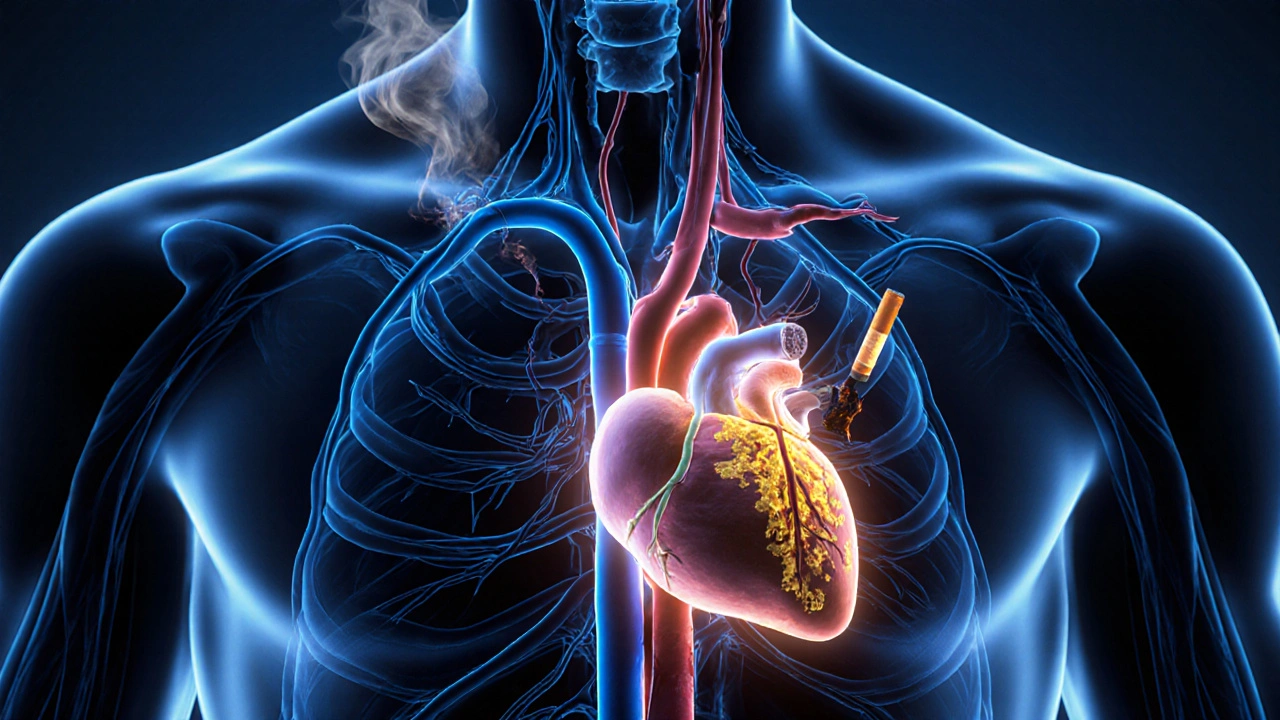Coronary Artery Disease Prevention
When working with coronary artery disease prevention, the practice of reducing the risk of plaque buildup in the heart arteries. Also known as CAD risk reduction, it focuses on keeping the coronary vessels clear and functional. A solid prevention plan hinges on a few core concepts that show up again and again in medical advice.
First, Hypertension, high blood pressure that strains artery walls is a major driver of coronary damage. Controlling blood pressure with lifestyle tweaks or meds like lisinopril directly lowers the stress on coronary arteries. Second, Cholesterol, the fat‑like substance that can form plaques must be kept in check. Statins, diet, and regular testing form the backbone of cholesterol management. Third, Lifestyle Modification, a group of habits that improve heart health—including exercise, smoking cessation, and balanced nutrition—creates a protective environment for the coronary arteries. Finally, Antiplatelet Therapy, medications like low‑dose aspirin that prevent blood clots offers an extra safety net for those at higher risk.
Key Pillars of Prevention
Putting those pieces together forms a clear roadmap. Coronary artery disease prevention encompasses lifestyle modification as its foundation, because regular aerobic activity improves blood vessel elasticity and helps lower both blood pressure and LDL‑cholesterol. Nutrition plays a similar role; swapping processed carbs for whole grains, nuts, and fatty fish reduces triglycerides and supports a healthier lipid profile. When diet and movement are in place, medication becomes a targeted tool rather than a last resort.
Managing hypertension requires regular monitoring. A reading consistently above 130/80 mm Hg signals the need for intervention. ACE inhibitors such as lisinopril, beta‑blockers, or calcium‑channel blockers can bring numbers down, and studies show that each 10 mm Hg reduction cuts coronary event risk by roughly 20 %. Meanwhile, controlling cholesterol hinges on the LDL‑to‑HDL ratio. An LDL level under 100 mg/dL is ideal for most adults; those with existing heart disease aim for under 70 mg/dL. Statins remain the most effective class, lowering LDL by 30‑50 % and offering modest anti‑inflammatory benefits.
For people with a history of heart attack or who have multiple risk factors, doctors often add antiplatelet therapy. Low‑dose aspirin (81 mg) irreversibly inhibits platelet aggregation, reducing the chance that a plaque rupture will trigger a clot. Recent guidelines suggest weighing bleeding risk against cardiovascular benefit, but many clinicians still recommend it for primary prevention in high‑risk individuals.
Each of these pillars interacts with the others, creating a network of protection. Hypertension control reduces arterial wall stress, which in turn lessens the chance that LDL‑cholesterol will infiltrate and form plaques. Conversely, a healthier lipid profile eases blood pressure management because the vessels stay more compliant. Adding antiplatelet therapy to a well‑controlled blood pressure and cholesterol regimen can slash the overall event rate further than any single measure alone.
Beyond the medical side, everyday choices make a huge difference. Quitting smoking delivers an instant drop in heart‑attack risk—within a year, the risk falls to about half that of a current smoker. Stress management, whether through mindfulness, hobbies, or adequate sleep, also helps keep blood pressure and inflammatory markers down.
Our collection of articles below dives deeper into each of these areas. You'll find side‑by‑side drug comparisons, step‑by‑step guides for buying affordable generics, and practical tips for reshaping daily habits. Whether you're looking for the best blood‑pressure pill, a safe way to purchase low‑cost statins, or simple diet swaps, the posts are organized to give you clear, actionable information.
Ready to explore the full range of resources? Scroll down to see detailed reviews, buying guides, and lifestyle advice that will help you build a comprehensive coronary artery disease prevention plan.
- October
7
2025 - 5
Smoking and Coronary Artery Disease: Why Quitting Saves Your Heart
Discover how smoking drives coronary artery disease, the rapid heart benefits of quitting, and a step‑by‑step plan to stop smoking for lasting heart health.
Read More